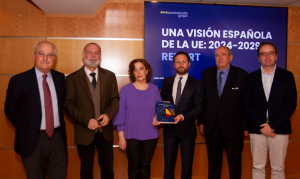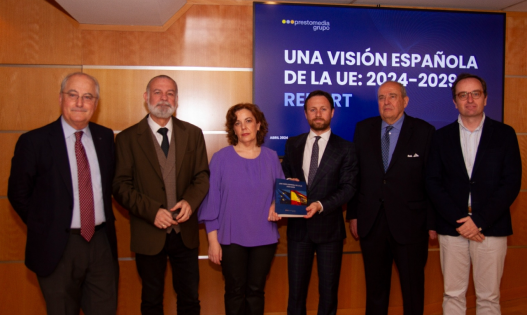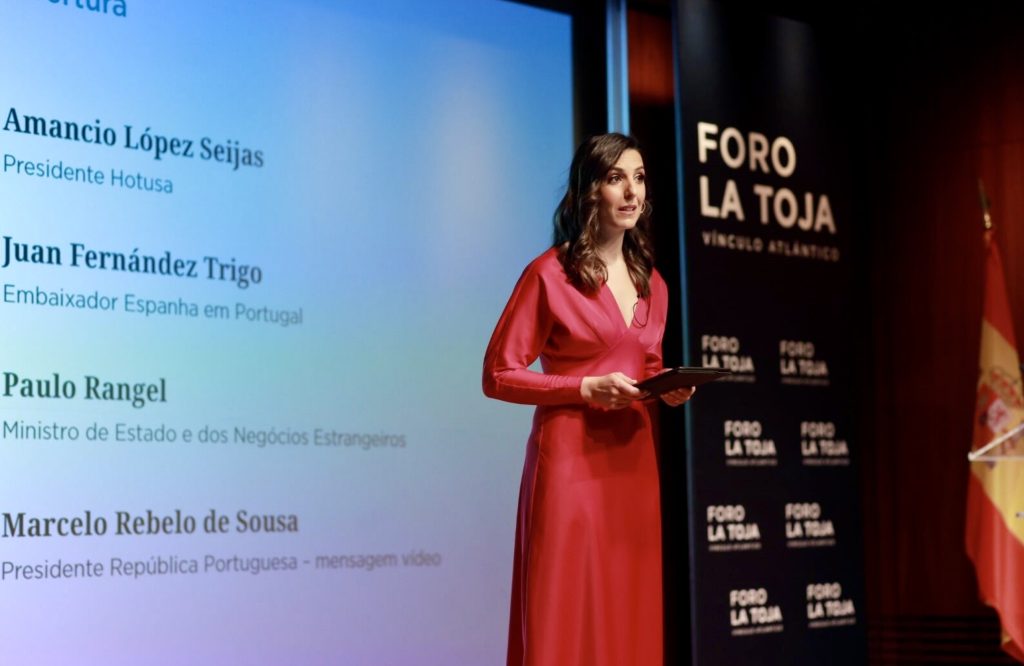
‘A SPANISH VISION OF THE EU: 2024-2029': THE REPORT THAT POSITIONS SPAIN AS A KEY STATE IN THE FUTURE OF THE EUROPEAN UNION
By Aquí Europa
The Prestomedia Group has presented its report “A Spanish vision of the EU: 2024-2029”, a comprehensive study that integrates Spain’s priorities in the future of the European Union, while betting on continuing to make “more Europe”.
The Madrid headquarters of the European Commission and the European Parliament, located at Paseo de la Castellana 46, hosted this Thursday, April 11, the presentation of the study “A Spanish vision of the EU: 2024-2029”, a work of the Prestomedia Group carried out by experts in European Policy and directed by Javier Elorza, Spain’s ambassador to the EU and Spain’s main negotiator in the EU treaties.
The event was inaugurated by Lucas González Ojeda, acting director of the European Commission Office in Madrid, who stated that this report is “absolutely relevant” and “can contribute to the direction that the strategic priorities” of the European Union should take. Following his speech, Yago González, the CEO of Prestomedia, revealed that this study was born from the Objective Europe team of advisors and that it aims to be an essential element to continue building “a Europe for all”.
After the presentation, the journalist Jesús González and director of Canal Europa and Aquí Europa was in charge of orchestrating a session that delved into the contents of the three chapters of the report. Before starting, González stated that the aim of this study is “to help build more and better Europe”.
INSTITUTIONAL GOVERNANCE ISSUES, WRITTEN BY JAVIER ELORZA
First, Javier Elorza participated, who, in addition to directing the study, is also the author of the first chapter “institutional governance issues”, in which he addresses the institutional reforms needed in the face of EU enlargement, the importance of the transition to qualified majority voting in key decisions and the urgency of peace in conflict regions such as Ukraine, Moldova and Georgia. The chapter stresses the need to reform the EU treaties to facilitate greater integration and cohesion, while maintaining Spain’s strategic interests.
During the event, the ambassador emphasized the need to reflect on how EU enlargement will be carried out: “How is it going to be paid for? And, how is it going to be done, it should not be done in any way, because otherwise the farmers will end up paying for it”.
THE “THEMATIC AND SECTORAL STUDY”, COORDINATED BY FRANCISCO FONSECA
The second part proposes a “Thematic and sectorial study” and counts with the collaboration of more than 15 professionals of the sector coordinated by Francisco Fonseca, who has held different high positions within the European Commission, the last one as director of the Representation of the European Commission in Spain. He is currently the director of the Institute of European Studies of the University of Valladolid.
In this chapter, the strategic role of Spain within the EU is highlighted, advocating for a greener, digital, and socially just Europe. It also highlights Spain’s opportunity to influence the key challenges of Europe’s future, such as ecological transition, digitalization, and economic and social cohesion, while emphasizing the importance of considering Spain not only as a key economic partner, but also as a cultural and political bridge to Latin America and Africa.
Francisco Fonseca defended in the presentation that this report means “thinking Europe in Spanish” and that it raises “key issues at a key moment”. In addition, Fonseca also assured that this part of the report aims to show “the needs of the Spanish people” and “what remains to be done” in the EU, placing Spain as a key State for the future of the Community.
A “PROSPECTIVE ANALYSIS”, SUPERVISED BY MARÍA LUISA HUMANES
The last part of this report consists of a “Prospective Analysis”, supervised by María Luisa Humanes, Vice Rector of International Relations at the Rey Juan Carlos University, which provides a vision of the future based on the opinion and attitude of Spaniards towards the EU. This chapter reveals a strong support of the Spanish population for greater European integration, although with nuances in certain policies. This analysis points towards a Europe that values democracy, solidarity and inclusion as the foundations for facing future crises and global challenges.
Thus, María Luisa Humanes explained that, with this chapter, which she defines as open, she intends to “go beyond the data on how Spaniards feel about the EU”, as well as to expose the social challenges facing the EU, from a Spanish point of view.
The report concludes with a call to action to strengthen the position of Spain and, therefore, of the European Union on the world stage. European leaders are urged to adopt a shared vision that balances integration and diversity, strengthens institutional governance and promotes a more cohesive and strategic common foreign and security policy.
————
This article was originally published by Aquí Europa, with whose permission we reproduce it.



